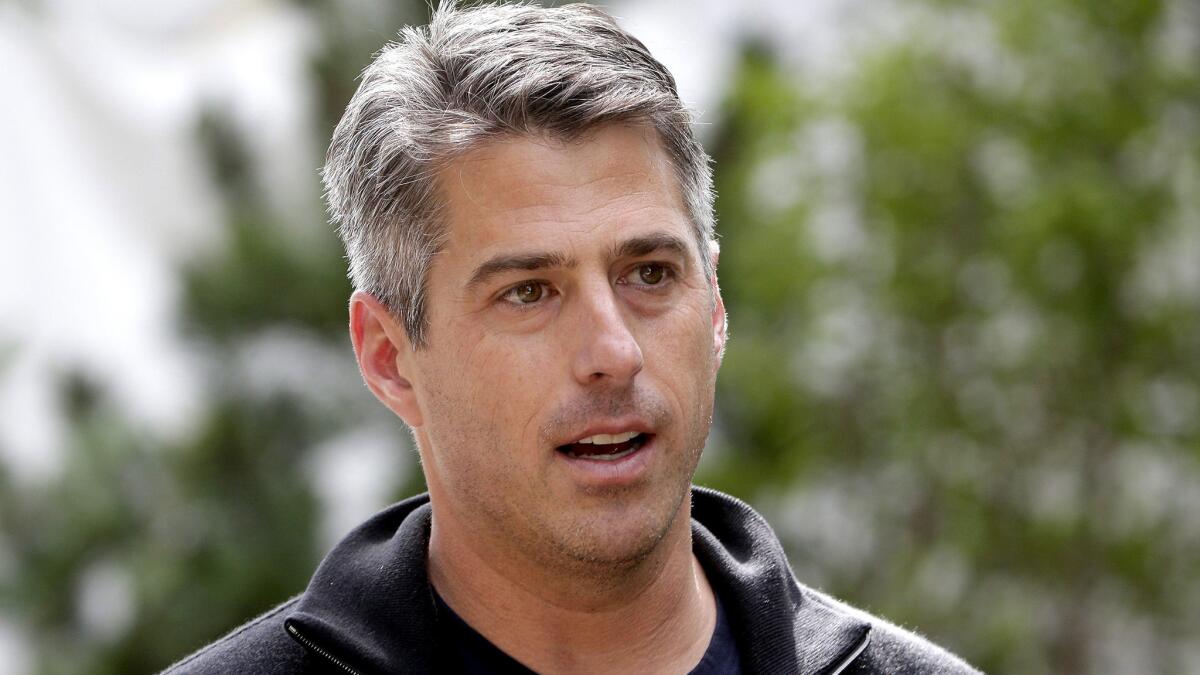L.A. City Council again pushes pause button on Olympic bid commitment

Casey Wasserman, who has worked closely with the mayor’s office on the Olympic bid, says that ‘if we’re not comfortable with the process, then we shouldn’t move forward.’
- Share via
A few weeks ago, it seemed a foregone conclusion that Los Angeles would bid for the 2024 Summer Olympics.
A team assembled by Mayor Eric Garcetti worked quietly behind the scenes, putting the finishing touches on a $4.5-billion plan and negotiating terms of the proposal with the U.S. Olympic Committee.
Now, the process has been pulled into the public spotlight and the road to the Games has become a little bumpier.
On Friday, Los Angeles City Council members once again delayed a vote on the issue, asking for assurances that a privately operated bid committee would keep them involved in decision-making over the next two years.
“We have a huge responsibility given to us by the voters,” Council President Herb Wesson said. “If we are going to attempt to bring what all of us hope to be a successful Olympics, then we need to be engaged in the planning and the budget.”
It remains likely the council will vote to support the bid, perhaps as early as Tuesday, authorizing Garcetti to sign an agreement with the USOC that officially launches the campaign.
But first, city staff will draft a “memorandum of understanding” that obligates the bid committee to bring key future contracts with the USOC and International Olympic Committee before the council for approval.
That includes the IOC’s controversial host contract, by which cities promise to cover all debts should unexpected costs exceed revenues.
Casey Wasserman, a sports executive who has worked closely with Garcetti, expressed confidence the matter can be resolved but offered a warning.
“The IOC has a process,” he told the council during a morning session. “If we’re not comfortable with the process, then we shouldn’t move forward.”
Timing represents a challenge for both city officials and bid leaders.
It was last winter that the USOC selected Boston to be America’s designated candidate. From the start, the Massachusetts bid struggled with public opposition and it was finally withdrawn in July when Mayor Marty Walsh waffled on his previous commitment to sign the host contract.
That brought Los Angeles — which had finished a close second to Boston in the domestic competition — back into play.
USOC leaders began negotiations with Garcetti’s office, saying they hoped to reach an agreement by the end of August, shortly before the IOC’s mid-September deadline for applications.
Los Angeles bid leaders, who had filed away their initial proposal, found themselves scrambling into action, trying to compress eight months of preparation into a month or so.
Council members, who did not receive the full bid book until Tuesday, also felt pressure to move quickly.
“Everybody wants it,” Councilman David Ryu said. “But we’ve got to get it right.”
Fellow Councilman Joe Buscaino likened the situation to “a hurry-up offense.”
The bid estimates $4.1 billion in expenses with an additional $400-million contingency fund for cost overruns. Garcetti has said that no taxpayer dollars would be necessary because the Games would generate a $161-million surplus through broadcast, sponsorship and ticket revenues.
But his projections depend on more than $1.7 billion in private-sector investment, raising the overall cost of the Games to $5.8 billion.
Transforming the aged Coliseum into a modern Olympic stadium would involve USC spending $500 million on its previously announced renovation plans. More significantly, the bid committee would need to partner with NBCUniversal to build a media center and with a yet-to-be-named developer for the athlete’s village.
Officials with the 2010 Winter Games in Vancouver and the 2012 Summer Games in London entered into similar arrangements, only to see their developers encounter financial problems and fail to finish the projects. Those governments paid hundreds of millions to complete construction.
In Vancouver, it took officials several years to recoup their money by selling off the village as condominiums.
For the Los Angeles bid, there are questions about a $1-billion estimate for a village along the L.A. River. A report from city analysts issued this week suggested the cost could be significantly higher and pointed to missing budgetary details.
Because cities bid for the Games nine years in advance, construction estimates can be tricky. Every Olympics since 1960 — even the ones that have reported a surplus — have experienced cost overruns.
With city funds at risk, council members worried that once Garcetti signed the initial contract with the USOC — known as a joinder agreement — they would be boxed out of further negotiations.
Earlier this week, they asked legal staff to craft amendments to the joinder. Paired with the proposed memorandum of understanding, the language would seek to ensure the council’s role in bid planning through the summer of 2017, when the IOC selects a host.
“What we’ve done is, we’ve given ourselves more time,” Wesson said. “So it is not a rushed decision.”
Bid leaders did not seem concerned about this week’s delays.
Wasserman said private donors had already pledged $35 million to fund the bid, adding that he had anticipated public discussion and a formalized arrangement with the council.
“We live in a democracy,” he said. “The city and the council and the communities need to be engaged and supportive, otherwise we won’t be successful regardless.”
Twitter: LATimesWharton
More to Read
Go beyond the scoreboard
Get the latest on L.A.'s teams in the daily Sports Report newsletter.
You may occasionally receive promotional content from the Los Angeles Times.










